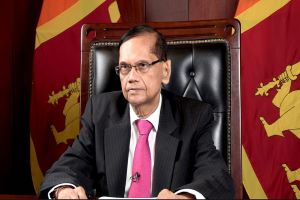
Human Rights Council 48th Regular Session
Agenda Item 2: Oral update on Sri Lanka by the High Commissioner for Human Rights
Statement by Hon. Prof. G.L. Peiris Foreign Minister of Sri Lanka (Geneva, 14 September 2021)
Madam President,
Let me begin by reiterating our strong and continued cooperation with this Council and the United Nations mandated human rights system, in keeping with our Constitution and our international obligations voluntarily undertaken.
Twelve years ago, Sri Lanka eradicated LTTE terrorism on its soil. We have restored peace, security and stability for the benefit of our people. We held firm to our democratic traditions and elections were held at regular intervals with high levels of voter participation – most recently at the 2019 Presidential and 2020 Parliamentary polls. The Government is committed to holding the Provincial Council elections at the earliest.
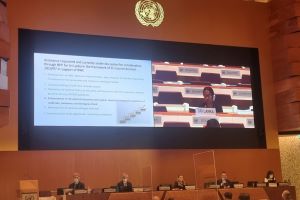
Intervention made during MX 3 - Strengthening National Implementation
Mr Chair,
Let me extend our warm congratulations on your assumption of duties as the chairperson, MX3 and hard work throughout.
Sri Lanka supports the BWC and very much in line with implementation process. We will further discuss implementation in Sri Lanka through preparedness and response at the proceedings of MX4
I would like to congratulate Japan and US for the interesting working papers and comprehensive methodology applied for training and information sharing.

Mr. President,
Since this is the first time my delegation takes the floor during your presidency, allow me at the outset to congratulate you on the assumption of the presidency. You can count on our full support.
We thank the distinguished panelists for their valuable `insights into this timely discussion on Women and International Security.
Mr. President,
We repeat among ourselves at each session that the CD is the sole multilateral disarmament negotiating forum. Yet, regrettably, we have not been successful in reaching consensus on a Programme of Work, let alone the negotiations.. Irrespective of the CD’s lack of progress, the world outside keeps moving and the already fragile international security situation is taking a turn for the worse. Trust in multilateralism is challenged and there are concerns on the return of strategic competition among military powers. It is in these worrying circumstances that we welcome this session on ‘Women´s participation and role in International Security, a discussion that will shed light on an important link on the chain of disarmament and non-proliferation that is often over looked.
Sri Lanka in 1960 produced the world’s first elected female Prime Minister who mooted the proposal for the Indian Ocean to be made a Zone of Peace at the United Nations General Assembly in 1971. , Sri Lanka has over the years seen women leaders rising up to important government positions including the office of the President, Cabinet Ministers, Chief Justice, and the Attorney General. In the recent past two Sri Lanka female career diplomats have held senior positions at the IAEA and at the OPCW contributing to disarmament and non-proliferation efforts. We consider active female participation is essential in the disarmament and non-proliferation discussions and negotiations due to several reasons.
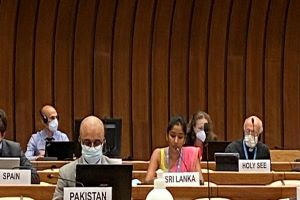
Mr. President,
Since this is the first time my delegation takes the floor during your presidency, allow me at the outset to congratulate you on the assumption of the presidency. You can count on the full support of my delegation.
We appreciate the valuable insights of the distinguished panelist including Ms. Jayathma Wickramanayake, United Nations Secretary General’s Envoy on Youth. Sri Lanka is proud of her leadership and proactive contribution to the youth strategy of the United Nations.
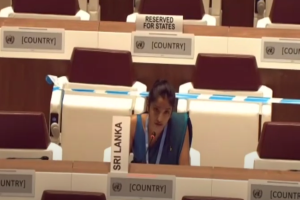
5 (a) An exploration of the potential challenges posed by emerging technologies in the area of lethal autonomous weapons systems to
international humanitarian law
3-13 July, 2021
Mr. Chair,
Excellencies, Distinguished participants,
At the outset, Sri Lanka would like to congratulate you on your assumption of the Chair of the Group of Governmental Experts on LAWS and for the continuous engagement with states on this issue. Let me assure you Mr. Chair, of the full support and cooperation of my delegation as we approach the preparation of the recommendations of the GGE to the 6th Review Conference of the CCW.
Sri Lanka aligns itself with the position expressed in the Working Paper submitted by Venezuela on behalf of the Non-Aligned Movement (NAM) on possible consensus recommendations.
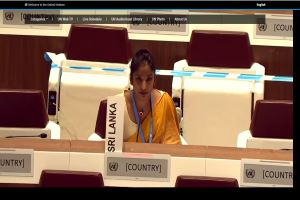
11 August 2021
Thank you Mr. Chair,
I will make two brief comments on section 3 before providing some comments on section 4. We fully support the retention of specific references to branches of international law in section 3.1 for reasons we have repeatedly mentioned in our previous statements and by other colleagues this morning as well.
Secondly, the willingness of programmers of autonomous weapon systems to ensure compliance with the existing legal norms and principles is a serious concern. Therefore, we support the inclusion of the word ‘development’ in section 2 as suggested by Austria and supported by other delegates.
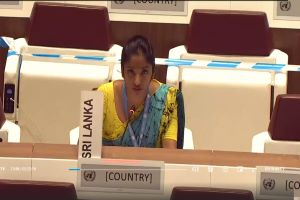
Sri Lanka fully supports the reference to international human rights law in the general considerations section. Given the possibility of autonomous technology to be used in situations of armed conflicts as well as in law enforcement situations, recognition of the relevance of international human rights law and criminal law is important. Principles of non-discrimination and human dignity are cardinal principles of international human rights law which have a direct relevance to our discussion today.
Secondly Sri Lanka supports a stronger emphasis on ethical considerations. While it is understood that ethical dimension is already included in the IHL principles, a separate paragraph on this issue, we believe is an important reinstatement. Decisions on human life are too important to be left to the blunt expedient of a mechanical judgment.
- Statement by Sri Lanka on Chair’s Working paper on draft elements on possible consensus recommendations in relation to the clarification , consideration and development of aspects of the normative and operational framework on emerging technologies in the
- Group of Governmental Experts on Lethal Autonomous Weapons Systems (LAWS) Statement by Sri Lanka
- Statement delivered by Sri Lanka during the Quadrennial panel discussion on promoting human rights through sport and the Olympic ideal at the 47th session of the Human Rights Council
